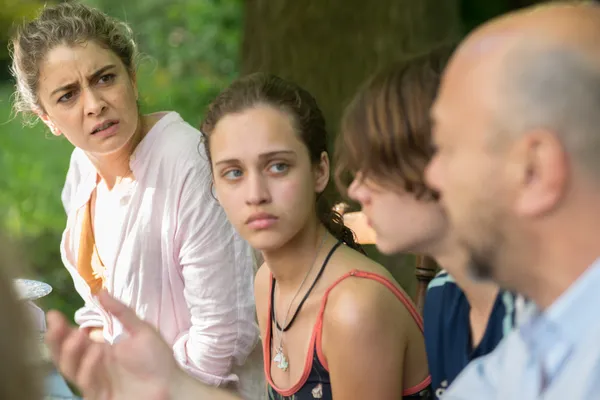Eye For Film >> Movies >> The Sleepwalkers (2019) Film Review
The Sleepwalkers
Reviewed by: Jennie Kermode

It’s because Ana (Ornella D’Elía) is sleepwalking that her mother Luisa (Erica Rivas) discovers that she has started menstruating. “Why didn’t you tell me?” she asks, summing up the tension between the two of them that will echo throughout the film. Ana increasingly wants to make her own choices, to control her own body and to enjoy the privacy assumed as a right by adults. Luisa isn’t ready to lose her little girl, in part because she needs an ally in her struggle to assert herself against her husband, Ana’s father, Emilio (Luis Ziembrowski).
Though we see relatively little of Emilio in the course of the film, his decisions dominate Ana and Luisa’s lives. Everything he says is direct, as if there is no more complex thought or consideration behind it; when things don’t immediately go the way he wants, he seems lost. By contrast, though they are often silent, we spend time with the female characters and see the world from their point of view. They may have less obvious power but they establish what is normal, establishing the context in which male characters’ actions are understood.
As the film begins, Emilio has decided that the family is to go and visit his mother in her sprawling country home for New Year. His siblings and their families are there as well, which leads to immediate territorial disputes over who is sleeping where. And when his brother’s eldest son, Alejo (Rafael Federman) also turns up, unexpectedly, another kind of trouble is on the horizon. Alejo loves to flirt with Luisa, spitefully, with the arrogance of a young man who assumes he’s irresistible and that all older women are desperate. She’s not naive enough to buy his act, but it’s yet another irritant in an already stressful situation. Ana, meanwhile, finds him a enticing outlet for her growing sexual urges, but isn’t necessarily ready for all that could follow from that, and as the adults are increasingly absorbed by their own petty arguments, nobody is looking out for her in the way she needs.
This being the southern hemisphere, New Year means hot weather: prising open windows, peeling off clothes, smouldering sexuality and suffocating frustration. Alejo helps himself to everything from beds to beers, uninterested in the feelings of other except where they amuse him. Ana skulks around spying on people and listening in to conversations she doesn’t fully understand. There’s a stark difference in how each of them is treated in relation to their coming of age: Alejo praised and celebrated, seeming to have the world at his feet, whilst Ana is introduced to a new world of insecurity. Luisa, going through her own change, is trying to summon up the courage to change her own role, whilst Emilio’s mother watches from the sidelines with a slightly contemptuous air, certain she’s seen it all before.
Iván Gierasinchuk’s languid cinematography and the beautiful locations promote the idea of lazy summer days, but nothing here is as peaceful as the various characters are trying to make it seem. The thing about sleepwalking is that sooner or later you wake up and wonder what happened.
Reviewed on: 11 Mar 2020















